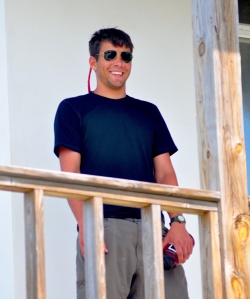Last week The Island School orchard received its first dose of steroids from the biodigester. The Island School biodigester uses naturally occurring bacteria to generate renewable energy and sterilize our septic waste. The outcome? Highly nutrient rich, liquid fertilizer that has the potential to increase crop yields substantially. In some cases, certain crops have increased their yields by up to sixty percent with the addition of biodigestion effluent. A resource such as this could work wonders for both CEI and Island School as we are always seeking more local food sources and readily available, healthy snacks. With a bit of sunshine to go with these nutrients, we could eventually put the marina store out of business. Coming into season right now are sour oranges, guava, mango, sugar apples, cherries, coconuts, sapodillas, and passion fruit. Pick your poison. The next questions to ask are how much food can we make and how fast? What does it take to ween ourselves of imported fruits and vegetables? A large part of the answer is our biodigestion system that is already producing for us on a daily basis.
[slideshow]
